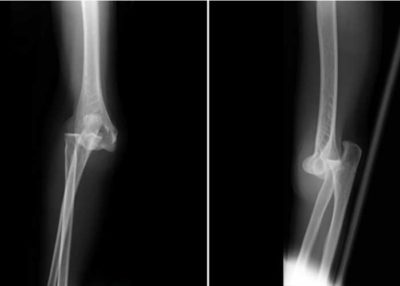Elbow Instability Specialist

Are you an athlete who participates in contact sports or do you participate in activites inwhich you may fall on an outstretched arm or hand? If so, you may have experienced an elbow dislocation and subsequent posteroloateral elbow instability. Elbow dislocation specialist, Doctor Riley J. Williams provides diagnosis as well as surgical and nonsurgical treatment options for patients in Manhattan, Brooklyn, New York City and surrounding areas who have sustained an el,bow injury. Contact Dr. Williams’ team today!
What is an elbow dislocation?
The elbow is a complex hinged joint consisting of the humerus, ulna and radius. During elbow dislocation, the ulna and radius bones in the forearm separate from the humerus leaving the joint out of place. Elbow dislocations often occur in association with a fall on an outstretched hand, and motor vehicle accidents. Elbow dislocations in children can occur when the child is lifted aggressively by their forearms. Abnormal force and torque applied to the forearm can twist the radius and ulna away from humerus bone and out of the elbow socket. Elbow dislocation can either be complete or partial (subluxation). Although elbow dislocations are rare, dislocation are only more common in the shoulder.

What is posterolateral elbow instability?
Posterolateral elbow instability is also known as posterolateral rotatory instability (PLRI) of the elbow. This condition is caused by a laxity in the lateral collateral ligament complex (LCL). The LCL consists of key ligament structures that are important for elbow stability. When there is damage to ligaments in the elbow, acute or chronic, posterolateral instability occurs. Such instability makes the elbow more susceptible to dislocations. Dr. Riley J. Williams, orthopedic elbow specialist serving Manhattan, Brooklyn, New York City, NY and surrounding areas has extensive experience in treating elbow dislocations and posterolateral elbow instability.
What are the symptoms of an elbow dislocation?
An elbow dislocation is an acute injury and usually requires immediate medical attention. Individuals in the New York are who experience a dislocated elbow report the following symptoms:
- Severe pain
- Noticeable elbow deformity
- Bruising
- Loss of elbow functionality
How is an elbow dislocation diagnosed?
Acute elbow dislocations should be evaluated emergently by medical personnel. Elbow dislocation are typically easy to diagnose given the dramatic deformity that accompany these injuries. Radiographs are helpful in diagnosing elbow dislocations. Immediate joint reduction is needed to prevent damage to the nerves and blood vessels of the arm. Once emergently treated, affected individuals should be seen by an elbow specialist.
Upon evaluating a patient who has suffered an elbow dislocation, Dr. Williams will discuss how the injury occurred and perform a physical exam. Imaging tests, such as x-rays, CT scans, and MRIs will help determine the injuries sustained to the bones and ligaments from the dislocation. It is important to have an orthopedic elbow specialist like Dr. Williams, evaluate your elbow dislocation to achieve the best possible outcome.
How is a dislocated elbow treated?
Non-surgical treatment:
Once the dislocated elbow is reduced, it is immobilized with a splint for up to 1-2 weeks. It is important to then begin range of motion exercises after a simple elbow dislocation to achieve full mobility and eliminate stiffness. Physical therapy may also be necessary to build strength, which could also help decrease the chances of the elbow dislocating again. Non-steroidal anti-inflammatory medications can help with pain and swelling during the healing process.
Surgical treatment:
If significant elbow ligament damage is sustained after an elbow dislocation, Dr. Williams may suggest surgery in order to repair the elbow. Ligament repair and reconstruction can effectively repair ligament damage associated with an elbow dislocation. It takes approximately 4-6 months to fully heal after this type of elbow surgery.
For more information on elbow dislocation, posterolateral elbow instability and the treatment options available, please contact the office of Riley J. Williams, MD, orthopedic elbow specialist serving Manhattan, Brooklyn, New York City, NY and surrounding areas.